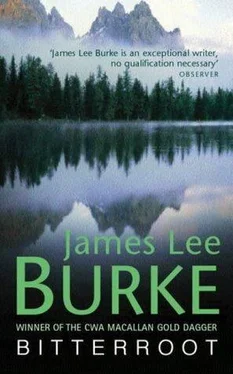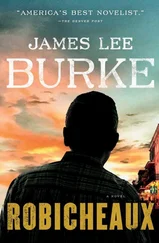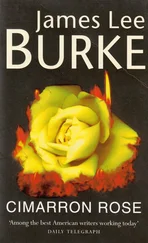I put my rucksack and fly vest and fly rod and creel into my truck and picked up Temple at her motel and took her for breakfast at a truck stop in Lolo. Then we drove deeper into the Bitterroot Valley, up a dirt road through meadowland to a canyon with a roaring creek and a chain of deep-water pools at the bottom. A trail followed the creek up a steady incline, winding under cliffs and the ponderosa that grew out of rock, until the creek and a series of falls were far below us. Then the trail leveled out in a box canyon filled with birch trees and we came out on the creek again, and sat on a table rock just above a pool that was so clear you could see the cutthroat and brook trout ginning in the current, ten feet below the surface.
I had known Temple most of her life. She hid her pain, rarely complained, and never accepted defeat. But now she had the same detached cast in her eyes that I had seen in Maisey's after Maisey was gang-raped. I flipped a dry fly at the head of the pool and hooked a small cutthroat, then wet my hand and released it and gave the rod to Temple.
"Cast it over on the other side. There's usually a fat one hanging under the bank," I said.
She was sitting against a birch tree with her knees pulled up before her. The rock was mottled with lichen and the leaves overhead flickered against the sunlight.
"I'll just watch," she said.
"I tried to get Lucas to go back to Deaf Smith. You wouldn't consider that yourself, would you?"
"I'll pass, thanks," she said.
I laid down my fly rod and sat next to her. I put my hand on her shoulder and brushed a lock of hair off her forehead. When she looked into my eyes I could read no meaning in them.
"What are you thinking, Temple?" I asked.
But she didn't answer. She leaned her head back against the tree and watched a bighorn sheep that stood on a ledge high up on the canyon's far wall. Her complexion had the glow and smoothness of a newly opened rose. I rested my hand on top of hers.
"Do you think of me as a victim, Billy Bob?" she asked.
"No, I don't."
"Then you don't need to worry about me."
Her nylon backpack was propped against a huckleberry bush. The flap had fallen open and inside I could see the blue-black finish and pearl-handled butt of her.38 revolver.
"You aim to kill Wyatt Dixon, don't you?" I said.
"You think of me as a friend or you think of me with guilt. But you don't think of me in other ways," she said, ignoring my statement.
"You're not fair," I said, and took my hand from hers.
She rose to her feet and gathered up her backpack by its straps and stepped off the rock onto the trail.
"I'm going to walk back now. It's pretty out here. Don't worry about this stuff. It's not your fault," she said.
And with that she slung her backpack over one shoulder and strolled back down the trail, her chestnut hair freckled with the sunlight that shone through the canopy, the clash of color in her jeans and pink tennis shoes somehow reminiscent of the little girl who lived inside her and who I'd learned could sometimes break my heart.
My great-grandfather, Sam Morgan Holland, the drover and drunkard and gunfighter turned saddle preacher, had kept a journal that told of the herds he had swum across the Red River and chased through mesa country and stream bottoms in electric storms on the Goodnight-Loving and Chisholm trails, his armed encounters with the Dalton-Doolin gang in Oklahoma Territory, and his love affair with the outlaw woman, the Rose of Cimarron.
But he wrote mostly about the abiding anger inside him that never allowed him to rest, that made him sit sleepless on the side of his bed in a patch of moonlight, his palms aching to hold his twin Navy Colt revolvers. In Wichita and Newton and Abilene, while prostitutes watched from the balconies of saloons, he lighted up the street with the flashes from his revolvers and filled the night with thunder and the smell of cordite and for just a moment felt he had righted the world and driven evil from his own breast by taking the lives of others who were worse men than he.
How did a man who had always been inclined for the cloth, who was basically decent and honorable, allow himself to be branded with the mark of Cain?
He did it at Little Round Top and Kennesaw Mountain and the Battle of Franklin, and learned it was easy. You just had to convince yourself, or be convinced by others, that your enemy deserved his fate and keep your mind free of empathy and moral restraint before you did it.
I ATE SUPPER early that afternoon, out of a tin plate and a cup from a GI mess kit, sitting on a stump down by the river, so I would not have to talk to anyone before I left Doc's house. But Doc caught me before I drove away.
"Where you going with L.Q.'s pistol?" he asked.
"Target shooting."
"You don't have enough room around here?" he said.
"Tag along if you like." I focused my eyes at a spot in empty space.
"You go ahead. Stay out of trouble. Don't follow my example."
"Wouldn't dream of it," I said.
I DROVE DOWN to Hamilton and went past Carl Hinkel's ranch to a farm road that wound down to the Bitterroot River. I parked my truck among cottonwoods in an empty campground and walked downstream until I was at the back of Hinkel's property. I stepped across a barbed-wire fence that ran down through a slough into the river and walked up a boulder-strewn, wooded incline until I was slightly above the log house where Wyatt Dixon lived. I could hear the muttering of a chain saw on the far side of the house.
The sun was still above the Bitterroots, but the pine trees on the incline were deep in shadow, the boulder I stood behind cool and damp to the touch. The light on the fields was soft, almost like a green vapor hanging over the grass, and Wyatt Dixon, stripped to the waist, his jeans so tight they looked stitched to his skin, walked into full view and went to work on a log he had propped across sawhorses, lopping it into segments for firewood.
The wind was in my face, the distance about seventy yards.
I took L.Q. Navarro's.45 revolver from my belt and steadied it with both hands on top of the boulder and sighted on Dixon's back. His skin was taut and brown, etched with vertebrae, his biceps pumped as he worked, his silky red hair creased in the wind.
Walk away, I heard a voice say inside me.
I looked around me in the shadows, among the pine trunks and the boulders that grew out of the humus like the tops of toadstools, but L.Q. was not there.
I pulled back the hammer on full cock and fired.
The.45 jerked upward from the rock, the report flattening in the wind.
I saw water jump in the river on the far side of Wyatt Dixon, and I knew the round had carried high and to the left.
My heart was thundering now. I fired a second and third time, the butt of the.45 raking finely against rock dust, the pleasant cordite smell of burned powder in my face. But Wyatt Dixon moved about unawares in the roar of the chain saw, the rounds missing him by inches. My hands were sweating on the ivory grips now, the air damp and tannic inside my lungs. When I fired again I thought I heard the round knock into wood.
This time Wyatt Dixon paused, as though a foreign object might have invaded his environment. He looked away at the river, the cottonwoods and aspens bending in the breeze, the mountains on the western side of the valley and the clouds that were now filled with a purple and gold sheen. Then he bent to his work again, his saw ripping a spray of white pulp out of the log.
I was sweating inside my clothes. Bile rose out of my stomach and I could smell the sourness of my own breath when I breathed into my palm. I pulled back the hammer with my thumb a fifth time.
Walk away, the voice said.
Yes, I thought. This time, yes.
Читать дальше












